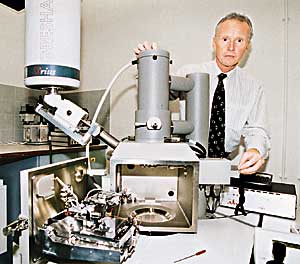New device makes micro-evidence clear
Armed robbers now have little chance of getting away with a shooting thanks to space-age technology which can examine gun smoke particles on a firer's hands.
One of the most significant advances in modern forensic science, next to DNA profiling, is the use of the Scanning Electron Microscope to examine microscopic gunshot residue which can be used to identify the gun's user and the ammunition's source.
The instrument was installed in the Forensic Firearms Examination Bureau in January and is now fully up-and-running.
Bureau head Senior Superintendent Brian Heard said with the equipment, it was possible not only to determine the calibre of weapon fired, but also trace the ammunition's country of manufacture.
When a weapon is fired, particles from the gun smoke are deposited on the hands of the user.
 Smoke scope: Senior Superintendent Brian Heard with the new gun smoke particle examiner |
"From the distribution of the particles over the hands it is also possible to determine whether the gun was fired with one or two hands or even whether the person was an innocent bystander," Mr Heard said. "With Chinese and Warsaw Pact ammunition it is also possible to identify the factory in which it was manufactured and also the year."
The automated scanning programme, designed largely by the Bureau itself, has greatly sped-up analysis time. Results can now be attained in days rather than in months like previously.
The device is the most modern available in the world and was constructed specifically for identification of these particles.
Mr Heard said residue could be detected in clothes months after an incident, leading to successful convictions.
"In a recent case, particles were recovered from the pockets of a suspect's clothing more than a year after the armed robbery incident. The particles were from Russian ammunition which had never surfaced in Hong Kong before and were of such an unusual composition that much of the prosecution's case rested on this aspect," Mr Heard said.
<< Back to Index >>